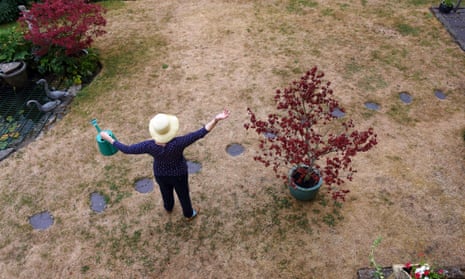The UK is facing the prospect of a drought being declared in August, experts have said, warning of potential crop failures after a period of remarkably dry weather and extreme heat.
Hosepipe bans for households could be brought in across the UK and farmers could be restricted from irrigating their crops if the government implements a drought plan.
On Tuesday, the National Drought Group, made up of government departments and affected groups, will meet to discuss a strategy to deal with the very dry conditions faced by England. Other countries in the UK are also discussing responses to the potential drought.
The meeting had been supposed to take place in October to plan for 2023, but conditions have become so dry that it has been brought forward.
Last week’s record-breaking heatwave baked the soil, leading farmers to increase irrigation for crops and increasing the rate of evaporation from waterways.
Farmers could be banned from watering their crops in the crucial period of August and September, with root vegetables such as potatoes under particular threat. Crops could fail through lack of water, and dry soil can make harvesting difficult.
Minette Batters, the president of the National Farmers’ Union, said: “We don’t have time to waste. The situation with water is very, very serious for growers – there are implications for costs and crop viability.”
Growers could face huge costs if their crop yields fall owing to the dry conditions, and many have already signed contracts with supermarkets and other suppliers, meaning they may have to shoulder these costs alone.
Batters said: “Who is going to be paying these extra costs? Everybody in the supply chain, retailers, have to make sure they pick up the tab for rising costs. Growers have already signed their contracts with supermarkets. It needs others in the chain to come and take these extra costs into account.”
Experts from the Met Office and Environment Agency are preparing for further heatwaves this summer as the weather is still very hot in Europe, and it is possible this could move up to the UK.
In Scotland, there has been a water scarcity risk alert following hot, dry weather with restrictions on abstractions being considered to mitigate risk. There is not representation from Scottish bodies on the National Drought Group and any hosepipe ban decisions would be made locally.
On the continent, droughts have already been announced, with Italy declaring a water security emergency and Spain and Portugal facing pressure.
“This really does highlight the futility of just relying on imports; other European countries are in far worse situations than we are,” Batters said. “We have taken our water supply for granted in this country for so long. We are not storing and moving water in the way that we should be. Water security and food security are inextricably linked and food security is incredibly important. We can’t see growers not having a viable crop.”
The most recent two droughts in the UK were declared in 2018 and 2011, but the extremely dry conditions and hot weather mean the government is preparing for a worse outcome this year.
An Environment Agency spokesperson said: “We’ve had prolonged dry weather this year which has led to exceptionally low river flows across much of England and reservoir levels falling across Yorkshire, central and south-west England. Recent hot temperatures will increase the likelihood of local impacts and put pressure on the water environment and wildlife.
“Environment Agency teams are monitoring river levels and responding to environmental incidents, and we are working with water companies to manage water resources and take precautionary actions to ensure the needs of water users and the environment are met. Water companies are also enacting their drought plans as a routine precaution to maintain water supply. “
Prof Chris Binnie, a water engineer who was formerly the president of the Chartered Institution of Water & Environmental Management, said that these droughts could happen more often because of climate change.
He explained: “In England climate change is likely to result in drier summers and wetter winters. However, with the increased temperatures, the summer dry spells are likely to last longer and hence increase the risk of droughts, especially in one summer season critical reservoirs.
“Some water companies have reservoirs that are lower than normal. Some may call for non-essential use bans. With higher temperatures there is greater evapotranspiration from the soil and vegetation. This means that when it next rains, more rain will be required to raise the soil water content to field capacity. This will delay the onset of increased river flow in the autumn and particularly will delay the recharge of groundwater aquifers which provide water supplies to some areas of the country.”









